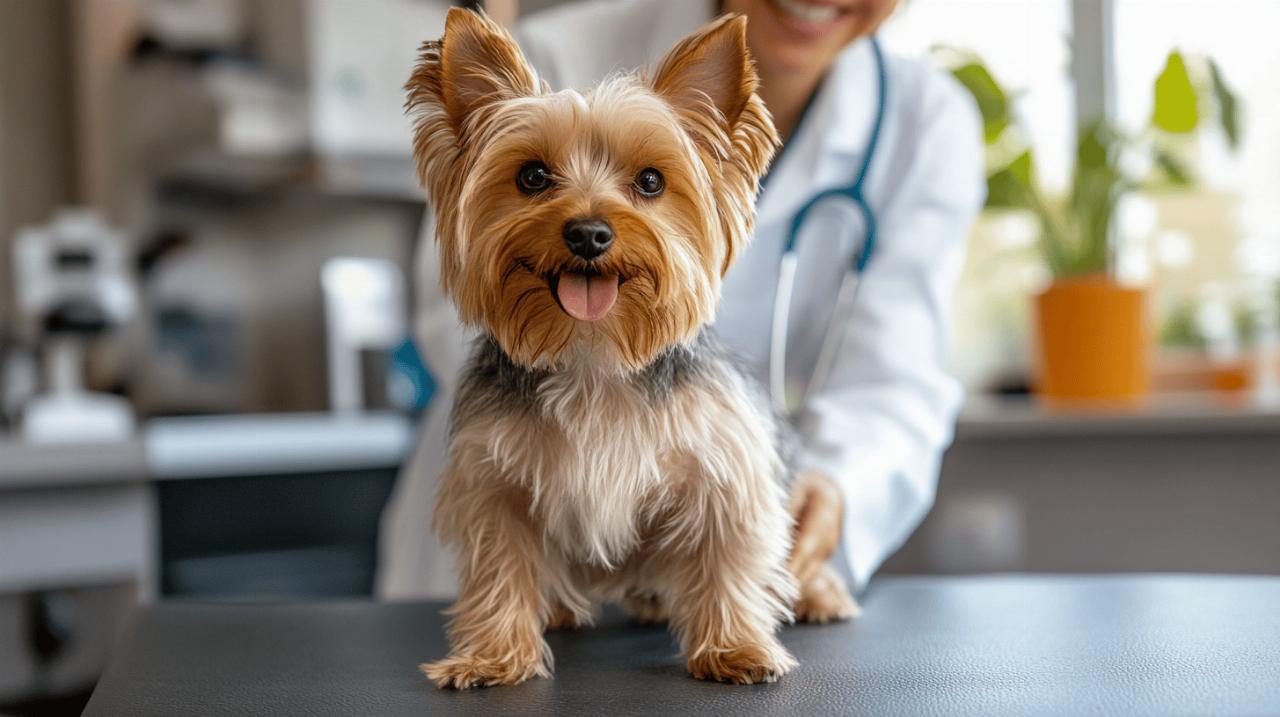Yorkshire Terriers, affectionately known as Yorkies, have captured the hearts of dog lovers across the United Kingdom and beyond with their bold personalities and endearing charm. These diminutive companions, originally bred to chase vermin from textile mills in Northern England, have evolved into beloved household pets that bring immense joy to their families. Understanding the needs of your Yorkie throughout their life, from their spirited puppy years to the quieter golden years, is essential for ensuring they remain healthy, comfortable, and content. With proper attention to their specific requirements, these loyal little dogs can enjoy a fulfilling life well into their senior years.
Understanding Your Yorkie's Lifespan: What to Expect from Puppyhood to Senior Years
Average life expectancy and factors that influence longevity
Yorkshire Terriers typically enjoy a lifespan ranging from twelve to sixteen years, which is quite respectable for a small breed. This longevity allows for many years of companionship, provided owners commit to meeting their health and wellbeing needs. Various factors can influence how long your Yorkie will live, including genetics, diet, exercise, and the quality of veterinary care they receive throughout their life. Ethical breeding practices play a significant role in ensuring that puppies are born with fewer genetic predispositions to serious health conditions, which can contribute to a longer and healthier life. It is worth noting that teacup Yorkies, which are bred to be even smaller than the standard size, often have shorter lifespans and may face additional health challenges due to their diminutive stature.
The care you provide from the moment you bring your Yorkie home will lay the foundation for their future health. Puppies require consistent feeding schedules to prevent hypoglycaemia, a condition that can occur when blood sugar levels drop too low. As they mature into adulthood, maintaining a balanced diet and regular exercise routine becomes crucial. Senior Yorkies, those reaching their golden years, benefit from adjustments to their care that accommodate changes in mobility, energy levels, and overall health. By understanding the different stages of your Yorkie's life, you can tailor your approach to their care and help them thrive at every age.
Recognising the Signs of Ageing in Your Yorkshire Terrier
As your Yorkie transitions from an energetic adult to a more sedate senior, you may notice subtle changes in their behaviour and physical condition. Older Yorkies often become less active, preferring shorter walks and more frequent rest periods. Their once glossy coat may lose some of its lustre, and grey hairs might appear around the muzzle and face. Changes in appetite, weight, and sleeping patterns are also common as dogs age. Some Yorkies may develop a degree of hearing or vision loss, which can affect how they respond to commands or navigate their environment.
It is important to observe these changes closely, as they can provide valuable insights into your dog's health. Whilst some alterations are a natural part of ageing, others may signal underlying health issues that require veterinary attention. For instance, increased lethargy, difficulty moving, or changes in bathroom habits could indicate conditions such as arthritis, kidney problems, or other age-related ailments. By staying attuned to your Yorkie's needs and consulting with your veterinarian regularly, you can ensure that any concerns are addressed promptly, allowing your companion to enjoy their later years with minimal discomfort.
Common Health Concerns in Yorkshire Terriers: Prevention and Early Detection
Dental Care, Patellar Luxation, and Tracheal Issues: What You Need to Know
Dental disease is one of the most prevalent health concerns affecting Yorkshire Terriers. Their small mouths and closely spaced teeth make them particularly susceptible to plaque buildup, tartar formation, and gum disease. Left untreated, dental problems can lead to pain, tooth loss, and even systemic infections that affect vital organs. Regular dental care, including brushing your Yorkie's teeth at least three times a week and scheduling professional cleanings with your veterinarian, is essential for maintaining their oral health. Additionally, Yorkies often retain their puppy teeth, which may need to be removed to prevent overcrowding and further dental complications.
Patellar luxation, a condition where the kneecap dislocates from its normal position, is another common issue in small breeds like the Yorkshire Terrier. This condition can cause intermittent lameness, discomfort, and difficulty walking. In mild cases, the kneecap may slip back into place on its own, but severe cases may require surgical intervention. Observing your Yorkie's gait and noting any signs of limping or reluctance to put weight on a leg can help you identify this condition early. Tracheal collapse, a condition in which the windpipe weakens and narrows, is also frequently seen in Yorkies. This can result in a distinctive honking cough, laboured breathing, and intolerance to exercise. Managing your dog's weight, avoiding collar pressure by using a harness, and seeking veterinary advice can help mitigate the impact of this condition.
Metabolic and Eye Conditions: Hypoglycaemia and Progressive Retinal Atrophy
Hypoglycaemia, or low blood sugar, is a metabolic concern that particularly affects young Yorkies and those with smaller body sizes. Symptoms include weakness, trembling, disorientation, and in severe cases, seizures or loss of consciousness. Ensuring that your Yorkie receives regular, balanced meals throughout the day can help prevent this condition. If you suspect your dog is experiencing a hypoglycaemic episode, offering a small amount of honey or a sugary solution can provide immediate relief, but it is crucial to follow up with your veterinarian to determine the underlying cause.
Progressive retinal atrophy is a genetic eye condition that leads to gradual vision loss and can eventually result in blindness. Whilst there is no cure for this disease, early detection through regular veterinary checkups can help you prepare for the changes your Yorkie may experience. Adapting your home environment to accommodate a visually impaired dog, such as keeping furniture in consistent locations and using verbal cues, can help your pet navigate their surroundings safely. Other eye conditions, such as cataracts and dry eye, are also seen in Yorkshire Terriers and require ongoing monitoring and treatment to preserve your dog's quality of life.
Daily care essentials: keeping your yorkie healthy and content
Nutrition, Exercise, and Grooming Requirements for Optimal Wellbeing
 Providing your Yorkshire Terrier with a balanced, high-quality diet is fundamental to their overall health and longevity. Small breed dog food is often recommended, as it is formulated to meet the specific nutritional needs of tiny dogs with fast metabolisms. Portion control is important to prevent obesity, which can exacerbate joint problems and increase the risk of conditions such as diabetes and heart disease. Feeding your Yorkie three times a day, particularly during their younger years, helps maintain stable blood sugar levels and supports healthy growth and development.
Providing your Yorkshire Terrier with a balanced, high-quality diet is fundamental to their overall health and longevity. Small breed dog food is often recommended, as it is formulated to meet the specific nutritional needs of tiny dogs with fast metabolisms. Portion control is important to prevent obesity, which can exacerbate joint problems and increase the risk of conditions such as diabetes and heart disease. Feeding your Yorkie three times a day, particularly during their younger years, helps maintain stable blood sugar levels and supports healthy growth and development.
Despite their small size, Yorkies are energetic dogs that require daily exercise to keep them physically fit and mentally stimulated. A minimum of thirty minutes of activity each day, broken into shorter walks or play sessions, is typically sufficient. These outings not only provide physical benefits but also offer opportunities for socialisation and mental enrichment. Be mindful of your Yorkie's sensitivity to temperature extremes, as they can be prone to overheating in warm weather and require warm clothing during colder months.
Grooming is another essential aspect of caring for a Yorkshire Terrier. Their long, silky coat requires daily brushing to prevent mats and tangles, and professional grooming every six to eight weeks helps keep their coat in top condition. Many owners opt for a puppy cut, which is shorter and easier to maintain. Regular grooming sessions also provide an opportunity to check for skin issues, lumps, or parasites. In addition to coat care, cleaning your Yorkie's ears weekly and maintaining their dental hygiene are vital components of their grooming routine.
The importance of regular veterinary checkups throughout their life
Routine veterinary care is a cornerstone of responsible dog ownership and plays a critical role in detecting and preventing health issues before they become serious. For younger Yorkies, annual checkups are generally sufficient, whilst senior dogs benefit from biannual visits to monitor age-related changes. During these appointments, your veterinarian will conduct a thorough physical examination, update vaccinations, and recommend preventative treatments for parasites such as fleas, ticks, and worms. Blood tests and other diagnostic screenings may also be performed to assess organ function and identify any early signs of disease.
Preventative care extends beyond the veterinary clinic. Keeping your Yorkie at a healthy weight, providing a consistent diet, and ensuring they receive adequate exercise all contribute to their long-term health. Neutering or spaying your dog can also reduce the risk of certain cancers and behavioural issues. If you notice any changes in your Yorkie's appetite, energy levels, bathroom habits, or behaviour, it is important to consult your veterinarian promptly. Early intervention can make a significant difference in the outcome of many health conditions, ensuring that your beloved companion enjoys the best possible quality of life.
Comfort Care for Elderly Yorkies: Supporting Your Companion in Their Golden Years
Adapting Your Home and Routine for a Senior Yorkshire Terrier
As your Yorkshire Terrier enters their senior years, making thoughtful adjustments to their living environment can greatly enhance their comfort and wellbeing. Older dogs may struggle with mobility issues, so providing easy access to their favourite resting spots is important. Consider placing ramps or steps near furniture to help them navigate without strain. Soft, supportive bedding can alleviate pressure on ageing joints and provide a cosy retreat for your Yorkie to relax. Ensuring that food and water bowls are easily accessible and positioned at a comfortable height can also make mealtimes less taxing for a senior dog.
Adapting your daily routine to accommodate your Yorkie's changing needs is equally important. Shorter, more frequent walks may be more suitable for an older dog with reduced stamina. Mental stimulation remains crucial, even as physical activity decreases, so engaging your Yorkie with interactive toys, gentle play, and new experiences can help keep their mind sharp. Maintaining a consistent schedule for feeding, exercise, and rest provides a sense of security and stability, which is particularly beneficial for senior dogs.
Monitoring Physical Changes and Behaviour: When to Seek Veterinary Advice
Vigilance is key when caring for an elderly Yorkshire Terrier, as subtle changes in their physical condition or behaviour can indicate underlying health concerns. Watch for signs such as difficulty standing, reluctance to climb stairs, or changes in their gait, as these may point to arthritis or other joint problems. Alterations in appetite, such as eating less or showing disinterest in food, can signal dental pain, digestive issues, or more serious conditions. Similarly, increased thirst and urination may be symptoms of diabetes or kidney disease, both of which are more common in older dogs.
Behavioural changes, such as increased clinginess, confusion, or uncharacteristic aggression, can also be indicators of discomfort or cognitive decline. Some senior dogs develop canine cognitive dysfunction, a condition similar to dementia in humans, which can affect their memory, awareness, and behaviour. If you observe any of these signs, seeking veterinary advice promptly is essential. Your veterinarian can perform a thorough examination, recommend appropriate treatments, and provide guidance on managing your Yorkie's condition. By staying attentive to your dog's needs and maintaining open communication with your veterinary team, you can ensure that your cherished companion receives the compassionate care they deserve throughout their golden years.


